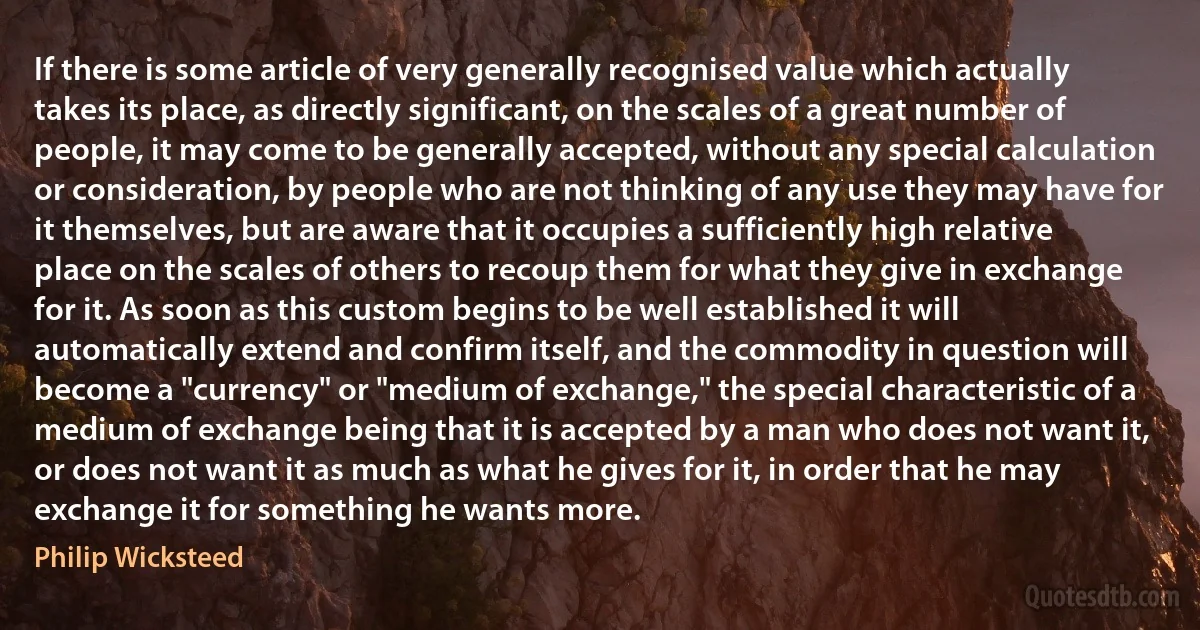
If there is some article of very generally recognised value which actually takes its place, as directly significant, on the scales of a great number of people, it may come to be generally accepted, without any special calculation or consideration, by people who are not thinking of any use they may have for it themselves, but are aware that it occupies a sufficiently high relative place on the scales of others to recoup them for what they give in exchange for it. As soon as this custom begins to be well established it will automatically extend and confirm itself, and the commodity in question will become a "currency" or "medium of exchange," the special characteristic of a medium of exchange being that it is accepted by a man who does not want it, or does not want it as much as what he gives for it, in order that he may exchange it for something he wants more.
Philip WicksteedRelated topics
article characteristic currency custom gives great high man number order people place question significant something thinking use value well othersRelated quotes
Indeed, if any man can say, that it is not an interesting question, whether his existence terminate at death, or is to be resumed at a future period, and then to continue for ever, he must be of a low and abject mind. To a rational being, capable of contemplating the wonders of nature, and of investigating the laws of it, and to a being of a social disposition, his existence, and the continuance of his rational faculties, must be an object of unspeakable value to him; and consequently he must ardently wish that christianity... may be true. For to a philosopher, who forms his judgment by what he actually observes, the doctrine of soul, capable of subsisting and acting when the body is in the grave, will never give any satisfaction. To every person, therefore, who is capable of enjoying his existence, the christian doctrine of a resurrection opens a glorious and transporting prospect.

Joseph Priestley
The innovator, however, must in the first place be discontented, he must doubt the value of what he is doing or question the accepted ways of doing it. And secondly, he must be prepared to take fresh paths, to venture into fields where he is by no means expert. This is true, at least, of major forms of innovation; they make it possible for other men to be expert, but are not themselves forms of expertise. Freud was not an expert psycho-analyst; before Freud wrote there was no such thing; he created the standards by which psycho-analysts are judged expert. Neither was Marx an expert in interpreting history in economic terms nor Darwin an expert in evolutionary biology. If a man is trained, purely and simply, to be expert and contented in a particular task he will not innovate; Freud would have remained an anatomist, Marx a philosopher, Darwin a field-naturalist.

John Passmore
Ron Paul: ...you have to develop the transition, and eventually the next step would be to prohibit the Fed from monetizing debt. This is the real evil. The politicians spend for war, welfare, and they don't have to do it responsibly.
Question: When you say monetize the debt, you mean they would only be able to spend the cash that they had on hand. They couldn't write any cheques for which they don't have in their account any money?
Ron Paul: That's right. And that is the key to it. Because when the Fed comes along, and there's starvation for capital and liquidity, and politicians are spending too much, the Fed can create 20, 30, 50 billion dollars in a day, just like they did trying to bail out this housing bubble crash. So they create money out of thin air endlessly, eventually that has to stop because that drives the value of the dollar down.

Ron Paul
Following the lead given by new institutional economics, we shall take the transaction as our unit of analysis. For our purposes, a transaction can be thought of as any act of social exchange that depends on information flows for its accomplishment. Transactions can be as simple and brief as the purchase of a packet of cigarettes, or as complex as and extended as those which bind a Zen master to his disciples. Like institutional economists, we are interested in the relationship that can be established between different transactional characteristics and the phenomenon of institutionalization. Our use of the term transaction, however, will extend beyond that of institutional economics where the focus has tended to be primarily on transaction costs and efficiency considerations. These, to be sure, are relevant. But, as we shall see, they are not the whole story.

Max Boisot
There is a limit to the number of (and I'm going to use this word in an entirely neutral sense) aliens who can be brought into a nation, particularly as close-knit and concentrated a nation as Britain is, without breaking the bounds of that society and setting up intolerable frictions and stresses as damaging to one side as to the other. Now, this is a question of number. But the relationship between number and difference is clearly important, because the more different they are – and colour is a signal, an outward signal of differences (not significant in itself, but it signalizes other differences that one can't deny) – the greater the difference, the smaller the numbers that can at any one time be accepted without breaking, or being thought to break (which comes to the same thing if we're talking about psychology), the framework of a nation and a society. So it's numbers.

Enoch Powell
